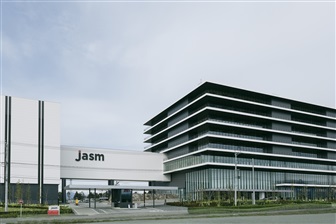Japan Advanced Semiconductor Manufacturing, Inc. (JASM), a majority-owned subsidiary of TSMC, held the opening ceremony of its first fab in Kumamoto on February 24, 2024. It has created several remarkable records that impressed TSMC founder Morris Chang enough to envision the start of a semiconductor Renaissance in Japan during his speech at the opening ceremony.
Slated to be the first overseas fab of TSMC to start mass production, Kumamoto is also the first TSMC site to collaborate with an automotive firm. TSMC's US$20 billion investment in JASM is the largest-ever Taiwanese investment in Japan, also expected to be the largest beneficiary of Japan's semiconductor subsidy and the first to produce advanced chips in Japan.
"JASM will improve the resiliency of semiconductor supplies for Japan and the world. It will also, I believe, and I hope, start a Renaissance of semiconductor manufacturing in Japan," said Morris Chang, emphasizing that semiconductors will be very much needed in the future.
Chang also disclosed that TSMC received an invitation from METI (Japan's Ministry of Economy, Trade and Industry) in 2019 to set up a semiconductors plant in Japan, which has finally become a reality. Kenichiro Yoshida, Chairman and CEO of Sony Group Corporation, also recalled that the two companies started the journey 3 years ago upon the request of C.C. Wei, CEO of TSMC, for Sony's support in their production in Japan.
Experts applauded TSMC's decision to establish a second fab to produce 6/7 nm chips in Japan. They said TSMC should continue to leverage Japan's excellent foundation science research capability and its advantages in semiconductor materials and equipment technologies to accelerate progress in advanced packaging and new processing architecture developments.
It took only 20 months to construct JASM's first fab, with more than 6,000 workers per day to construct Japan's first billion-dollar semiconductor investment project in at least a decade. JASM maintained high-quality craftsmanship and adhered to global standards despite the staggering speed.

Credit: TSMC
Unleash innovation and economic stimuli
TSMC Chairman Mark Liu said, "We are thankful for the joint efforts of our partners in Japan, whose unfaltering support has contributed greatly to the success of this project." With both fabs, JASM's Kumamoto site is expected to offer a total production capacity of more than 100,000 12-inch wafers per month starting from 40, 22/28, 12/16, and 6/7 nanometer process technologies for automotive, industrial, consumer, and high-performance computing (HPC)-related applications. The overall investment in JASM will exceed US$20 billion with strong support from the Japanese government.
"JASM will use the latest green manufacturing practices to produce best-in-class specialty semiconductor technology that will help to unleash innovation and bolster the Japanese economy for years to come," Liu said.
The two fabs are expected to create more than 3,400 high-tech professional jobs. In line with TSMC's commitment to green manufacturing, JASM will implement rigorous sustainability practices, including using 100% renewable energy when it starts operations, replenishing more than 100% of the used groundwater, and building a local supply chain.
JASM has created a stronger-than-expected economic effect for Kumamoto, including double wage growth and subsequent investments in Japan from other semiconductor companies. According to an economic impact analysis by the Kyushu Economic Research Center, JASM and its supply chain ecosystem will generate JPY20.1 trillion in economic output for Kyushu in 10 years.
The dimension of the JASM site is around 21.3 hectares. The leading-edge fab will be equipped with approximately 45,000 m2 cleanroom, with production targeted to begin by the end of 2024. Construction of the first fab commenced in April 2022 and was completed at the end of 2023. Construction partner Kajima Corporation President Hiromasa Amano said the speed of construction at the scale has never been seen before in Japan. "Almost all the cranes in Japan were shipped here to help build JASM," joked Kumamoto Governor Ikuo Kabashima.
Construction speed faster than expected
Kajima Corporation's Amano said it was TSMC's request to complete the construction in 2 years, and his company exceeded TSMC's expectation of completing the project in less than 2 years. It takes an average of 584 days to build a fab in Japan between 1990-2020, the fastest among all countries in the world, according to a study released by the Center for Security and Emerging Technology (CSET), a US research institute.
The opening marks a significant milestone for JASM. The fab was established in 2021 and started construction in April 2022, with production targeted to begin by the end of 2024. TSMC and minority investors Sony Semiconductor Solutions (SSS), DENSO, and Toyota also recently announced further investment into JASM to build a second fab, which is scheduled to commence construction by the end of 2024 and begin operation by the end of the 2027 calendar year. TSMC, Sony, DENSO, and Toyota shareholdings in JASM are 86.5%, 6.0%, 5.5%, and 2.0%, respectively.
Representatives from TSMC to the opening ceremony in Kumamoto Prefecture, Japan, included Founder Morris Chang, Chairman Mark Liu, and CEO C.C. Wei. Representatives of key partners in establishing JASM, Sony Group Corporation Chairman and CEO Kenichiro Yoshida, DENSO Corporation President and COO Shinnosuke Hayashi, and Toyota Motor Corporation Chairman Akio Toyoda also participated in this historical moment.
During the event, Prime Minister Kishida announced through video that the Japanese government has decided to support the newly announced expansion of JASM as a concrete example of its implementation of the Domestic Investment Promotion Package formulated in December last year. Media reports said Japan will soon announce a US$5 billion subsidy for JASM's second fab. METI minister Ken Saito confirmed to the press after the Opening Ceremony that it will subsidize JPY732 billion (US$4.9 billion) with the condition of at least 10 years of production and strengthening procurement from local supply chains.
Other distinguished guests included Japanese Minister of Economy, Trade and Industry Ken Saito, Chairman of the Liberal Democratic Party coalition in Semiconductor Strategy Akira Amari, Former Minister of Economy, Trade and Industry Koichi Hagiuda, Kumamoto Governor Ikuo Kabashima, etc.


